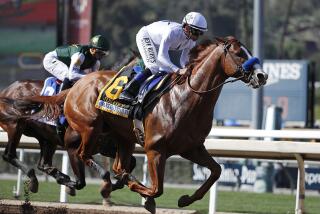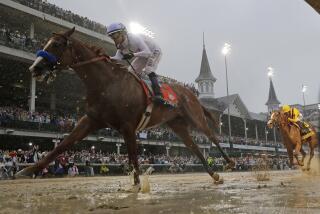France defends NASCAR policy
- Share via
NEW YORK -- NASCAR’s chief executive on Friday vigorously defended his organization’s drug testing policy in the wake of a recent revelation that a former driver injected heroin on race days.
Speaking to sports editors from some of the nation’s largest news organizations, Brian France said NASCAR currently tests with “probable cause” if it suspects a driver may be under the influence of drugs or alcohol. But he expressed reservations about random drug testing even though top NASCAR drivers have said they would be willing to have them to keep the confidence of fans and sponsors.
Random testing in other sports, France pointed out, is “not open ended. [But] in our situation we can test you every day if . . . we’re concerned about something, with no limits. I don’t know how you can beat that” in terms of being aggressive about a potential problem.
However, asked how often NASCAR had ordered tests in the last year, France cited concerns about privacy and would not provide an estimate.
“If there is an issue, we take that action and we make it public. We do not on a week-in week-out basis, every time we test a driver, make that public,” he said.
“Sometimes people have told us, ‘I don’t mind being tested. I’ll comply with your policy, but just the idea if you said you tested me this weekend it might imply there was some problem with me and I don’t have a problem. Happy to do it, happy to test, but we all know guilt by association.’ You get indicted in this country, right? It hasn’t gone to court yet, but most people think you did something wrong,” France said.
Asked if those privacy concerns wouldn’t be rectified by tests that were performed randomly, France replied, “If that’s something that comes out of our review that we think will enhance our overall policy, then I think we’ll consider it.”
Interest in NASCAR’s drug testing shifted into high gear after former Craftsman Truck Series driver Aaron Fike was quoted in ESPN magazine this month saying he fought addiction for years and used heroin for eight months, including race days, before his arrest last summer at a suburban Cincinnati amusement park.
In the same article, Tom DeLoach, the co-owner and general manager of the racing team that employed Fike, said he and others affiliated with the team had no idea that his driver was using illegal drugs.
Fike originally faced felony drug charges, but they were reduced to misdemeanors and he was sentenced to two years’ probation, community service and requirements for rehabilitation and counseling. He was suspended indefinitely by NASCAR, but he now competes in the USAC Midget Series, which tests him when he arrives before each race.
“I always tell people you can have . . . all the testing you want, but what do you do when you catch somebody? What happens?” France said. “In our situation, we have several people on a real lifetime ban. We’ve got a number of drivers who on first infractions are gone for a year or longer. So we have a very strict, severe punishment should there be a problem. Between that and the way that the corporate involvement is in our sport, it probably ends your career.
“If you’re going to have a drug problem in our sport, you’re going to have a tough time having a career in our sport.”
Fike, 25, is among seven NASCAR drivers who have been suspended indefinitely since 2000 -- four for missing or failing tests and three who were caught by law enforcement. Fike’s published admission prompted NASCAR to “question everything,” France said. “We enhance things as we go on. That’s what our group is trying to figure out, how to enhance what we already have,” he said. “But if there’s a way to make it better, we will.”
--
More to Read
Go beyond the scoreboard
Get the latest on L.A.'s teams in the daily Sports Report newsletter.
You may occasionally receive promotional content from the Los Angeles Times.











